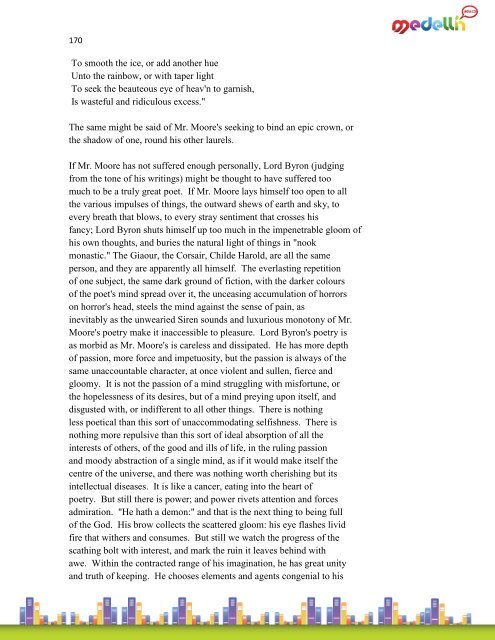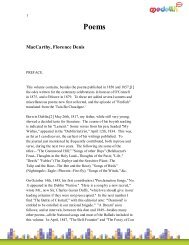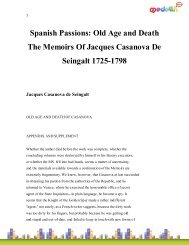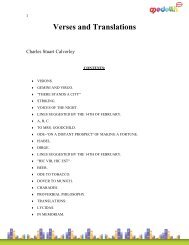Lectures On The English Poets William Hazlitt
Lectures On The English Poets William Hazlitt
Lectures On The English Poets William Hazlitt
Create successful ePaper yourself
Turn your PDF publications into a flip-book with our unique Google optimized e-Paper software.
170<br />
To smooth the ice, or add another hue<br />
Unto the rainbow, or with taper light<br />
To seek the beauteous eye of heav'n to garnish,<br />
Is wasteful and ridiculous excess."<br />
<strong>The</strong> same might be said of Mr. Moore's seeking to bind an epic crown, or<br />
the shadow of one, round his other laurels.<br />
If Mr. Moore has not suffered enough personally, Lord Byron (judging<br />
from the tone of his writings) might be thought to have suffered too<br />
much to be a truly great poet. If Mr. Moore lays himself too open to all<br />
the various impulses of things, the outward shews of earth and sky, to<br />
every breath that blows, to every stray sentiment that crosses his<br />
fancy; Lord Byron shuts himself up too much in the impenetrable gloom of<br />
his own thoughts, and buries the natural light of things in "nook<br />
monastic." <strong>The</strong> Giaour, the Corsair, Childe Harold, are all the same<br />
person, and they are apparently all himself. <strong>The</strong> everlasting repetition<br />
of one subject, the same dark ground of fiction, with the darker colours<br />
of the poet's mind spread over it, the unceasing accumulation of horrors<br />
on horror's head, steels the mind against the sense of pain, as<br />
inevitably as the unwearied Siren sounds and luxurious monotony of Mr.<br />
Moore's poetry make it inaccessible to pleasure. Lord Byron's poetry is<br />
as morbid as Mr. Moore's is careless and dissipated. He has more depth<br />
of passion, more force and impetuosity, but the passion is always of the<br />
same unaccountable character, at once violent and sullen, fierce and<br />
gloomy. It is not the passion of a mind struggling with misfortune, or<br />
the hopelessness of its desires, but of a mind preying upon itself, and<br />
disgusted with, or indifferent to all other things. <strong>The</strong>re is nothing<br />
less poetical than this sort of unaccommodating selfishness. <strong>The</strong>re is<br />
nothing more repulsive than this sort of ideal absorption of all the<br />
interests of others, of the good and ills of life, in the ruling passion<br />
and moody abstraction of a single mind, as if it would make itself the<br />
centre of the universe, and there was nothing worth cherishing but its<br />
intellectual diseases. It is like a cancer, eating into the heart of<br />
poetry. But still there is power; and power rivets attention and forces<br />
admiration. "He hath a demon:" and that is the next thing to being full<br />
of the God. His brow collects the scattered gloom: his eye flashes livid<br />
fire that withers and consumes. But still we watch the progress of the<br />
scathing bolt with interest, and mark the ruin it leaves behind with<br />
awe. Within the contracted range of his imagination, he has great unity<br />
and truth of keeping. He chooses elements and agents congenial to his

















